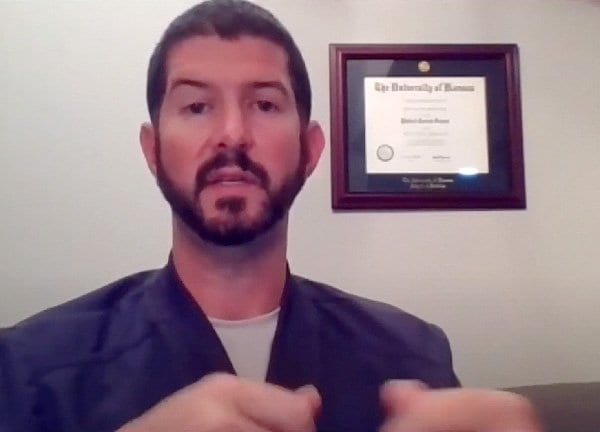ALTO project aims to provide pain management while reducing opioid use
Jessica Brewer, LMH Health

Watch the Opioid & Pain Awareness Panel Discussion
On September 10, 2020, the Lawrence Public Library hosted a virtual event featuring Dr. Marc Scarbrough, Dr. Patrick Harper, Kyle Eichelberger, PharmD and Kevin Joles, Lawrence-Douglas County Fire & Medical. This panel-style discussion focused on the impact of opioid use disorders, risk factors, safe pain management and local community resources regarding the opioid crisis across our community and country.
The opioid epidemic is a leading public health issue that not only affects health but also social and economic welfare, costing the country over $78 billion per year. In 2019, conversations between the LMH Health Emergency Department (ED) and Inpatient Pharmacy began around how to best serve patients while prescribing the least amount of opioid medications possible. After conversations kept rolling, the Alternative to Opioids Project, or ALTO, began.
ALTO is an Emergency Department project that aims to reduce opioid use by managing certain types of pain with non-opioid medications. This project improved the tracking and trending of opioids administered and prescribed in the ED.
Kyle Eichelberger, a pharmacist with the LMH Health inpatient pharmacy, said that the project aims to provide a coordinated effort among LMH Health providers to support and guide responsible planning and management of pain and opioid use for all patients.
“We want to keep our patients safe,” Eichelberger said. “We found that with ALTO we reduced opioid prescriptions in the ED around 26% for February and 15% for March compared to the prior year.”
Eichelberger said the goals of the ALTO project are:
- Providing appropriate, timely and safe pain management for all patients
- Maximizing non-opioid therapeutic options to help reduce risk of addiction, overdose and adverse effects
- Compliance with current regulatory requirements
- Promoting education on pain management, safe opioid prescribing, administration, and patient monitoring
- Identifying and implementing process improvement activities related to opioid stewardship and pain management
- Enhancing patient experience regarding opioid utilization and pain management
Taking a deeper look at opioid use
Hollie Porras, a 12-month pharmacy resident at LMH Health, said that she and Eichelberger, along with numerous others, conducted a study analyzing opioid use in the emergency department that looked at the effect of the ALTO approach to pain management.
“We created and provided educational tools regarding the use and effectiveness of ALTO for the ED providers, pharmacists and nurses,” Porras said. “We also created a flyer to put in each exam room to inform patients of our shift in pain management practices.
“The outcomes we looked at were any change in opioids administered in the ED before and after the ALTO protocol was implemented. We also looked at the number of opioid prescriptions provided to patients when they discharged and any change in patient experience scores.”
When the results were analyzed, they revealed a significant reduction in the number of opioids administered and a significant reduction in opioid prescriptions provided to patients than in 2019.
Reducing opioid use without affecting patients
“Our study concluded that the implementation of an ALTO pain management protocol in our ED resulted in significant reductions of opioid use without negatively affecting patient experience,” Porras said. “Overall, the ALTO approach allows patients access to effective pain management without exposing them to negative side effects, such as addiction, that can come with opioid medications.”
Jana Wallen, outcomes coordinator at LMH Health, said this project was a labor of love. It was a successful study because of the help from many departments within LMH Health.
“This project also included the help of the Quality, IT and Data Analytics departments to get everything built properly,” Wallen said. “We are also excited to announce an event we are hosting with the Lawrence Public Library on Sept. 10 that will focus on the community and their questions about topics such as opioid use, hospital initiatives and safety measures.”
Eichelberger said that without the help of the amazing team at LMH Health and community partners, the program and the steps taken so far to reduce opioid usage would not be the same.
A community partnership
“Because of our partnerships with Douglas County Public Health, DCCCA and Heartland Community Health Center, we have had help breaking down overdose data, getting opioid disposal bags and getting a MedSafe opioid dropbox for patients to safely and securely dispose of the unused prescription opioid medication.”
The implementation of the ALTO program was a success, but LMH Health isn’t stopping there. With the successful results, Eichelberger said the team intends to further look to determine where else this approach could be implemented.
“Our next steps are to implement the Opioid Dashboard Tool, which offers ED providers a snapshot of their opioid prescribing patterns,” he said. “Additionally, the results of this study indicate that an ALTO-first protocol in other areas of the health system may be worth investigating.”
Jessica Brewer is the social media and digital communications specialist at LMH Health.